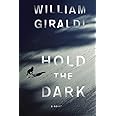In the realm of contemporary literature, few novels encapsulate the haunting allure of the human psyche and the primal forces of nature quite like “Hold the Dark” by William Giraldi. This enthralling narrative breathes life into the cold, brooding landscape of Alaska, which serves not only as a backdrop but as a character in its own right. The novel delves into themes of darkness—both literal and metaphorical—while examining the expectations and burdens thrust upon its characters. As the story unfolds, readers are compelled to grapple with the expectations placed on individuals, the intricacies of their moral choices, and the inexorable pull of the wild.
At the heart of this tale lies the enigmatic figure of Russell Core, a wildlife expert summoned to the desolate wilderness at the behest of a desperate mother, who believes that wolves have taken her son. Core, steeped in the lore of nature and the predatory dance between man and beast, brings with him a multitude of expectations. He embodies the archetype of the solitary guardian, a man forged in the fires of his own past. Readers are introduced to him in a moment of quiet contemplation, a man who seeks solace in the vast, ungoverned terrains. Yet, what awaits him in the Alaskan wilds is a cacophony of human emotion punctuated by the raw inevitability of life and death.
The call to action that Russell receives is steeped in urgency and underlying tragedy. It forces him to confront not only the external wilderness but also the shadowy alcoves of his own past. As he traverses this treacherous landscape, Core must navigate the labyrinth of expectations that surround him. Third-party inflections of doubt seem to coalesce into a mantra of skepticism regarding his abilities, yet he powers through; a testament to his determination. The reader senses a growing tension—a tumultuous grappling with guilt, obligation, and uncertainty that questions the very essence of duty and survival.
Parallel to Core’s journey, the character of Medora Slone, the grieving mother, emerges as a haunting specter. Her spectral presence encapsulates despair and desperation, laying before Russell the emotional expectations that shadow his mission. Slone’s motivations are enigmatic, steeped in an unresolved anguish that permeates her every decision. Her initial portrayal evokes empathy, yet as the narrative unfurls, her layered complexities render her both a victim and a conspirator in the broader fabric of darkness. Does she genuinely believe that wolves have abducted her son, or is this belief a reflection of her own fractured psyche? Her expectations of Core, rooted in her despair, propel the story into harrowing new territories.
The novel’s exploration of the wilderness acts as a metaphor for the uncharted territories of human emotion and morality. As Core becomes increasingly ensnared in Slone’s world of anguish, he encounters her husband, the brooding and ominous figure of Vernon Slone. Accompanying a myriad of unresolved psychological issues, Vernon represents the ultimate expectation of what it means to be a protector. The classic tropes of masculinity and the expectations thereof ripple through each encounter, culminating in a confrontation that forces all characters to unmask their true selves. Vernon’s ominous presence is laden with the expectations of violence and retribution, questioning whether man can ever truly distance oneself from the primal instincts that govern both beast and man alike.
The intricate web of expectations does not end with the characters themselves; it extends outward, encapsulating the town of Keelut. This isolated community, straddling the line between civilization and the wilderness, echoes the trepidation and paranoia that infiltrate Core’s mission. The townsfolk’s collective fear of the wolves symbolizes a deeper existential dread, reflecting their own insecurities, loss, and the brutal realities of survival. This societal expectation—the anticipation of tragedy amidst the fierce, unrelenting nature—pervades every interaction and amplifies the inner turmoil experienced by Core, Medora, and Vernon.
As the haunting tale progresses, readers become acutely aware of how these expectations manifest in unimaginable ways. Secrets seethe beneath the icy surface, unpredictably carving paths of violence and grief. The narrative becomes increasingly claustrophobic, layered with tension that spirals into a climax that is startlingly visceral. Every decision, every response to the dangers posed by nature and humanity alike, is a reflection of the expectations that have bound these characters.
In their quest for understanding and resolution, the characters are forced to confront the very fabric of morality. Core’s initial role as a protector evolves into that of a reluctant participant in unfolding horrors, a juxtaposition that challenges the very notion of heroism. The stark dichotomy between expectation and reality serves as a powerful commentary on the duality of human nature: can one truly hold the darkness at bay? Or will it ultimately eclipse one’s moral compass?
“Hold the Dark” emerges as a vivid tapestry woven with threads of human emotion, encapsulated within a chillingly beautiful setting. Through the complexities of Russell, Medora, and Vernon Slone, the narrative challenges readers to consider what is expected—not only from others but also from oneself. With every turn of the page, expectations are dismantled and rebuilt in meticulous detail, leading to an ending that resonates long after the final word is read. Ultimately, Giraldi invites us to ponder the fragility of existence and the shadows that lurk in the psyche, proving yet again that the most profound tales emerge from the depths of our darkest fears.

